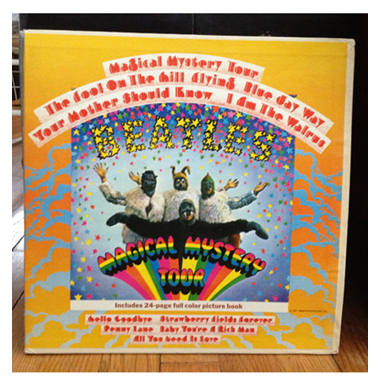There’s no explaining the imagery that pops into the mind uninvited, much less the bits of melody and the memories that come along for the ride. Cue the Mamas and the Papas, singing a few bars of California Dreamin.
I’m not really old enough to remember the original foursome in any detail (cough, choke, ahem). Yet for some reason, an image of an album cover, hippie hair, and that late 60s tune floated through my consciousness last evening.
And I smiled.
I found myself tripping – so to speak – through an odd collection of visual snippets and a mish-mash of thoughts: I considered the advantages of bangs (cute on kids and 60s pop stars), the irritation of washing a mane that falls to the waist (as mine nearly did), the brightly colored posters that were once tacked up on my bedroom walls (alas, no Peter Max).
I felt a sudden urge to dig out a dozen worn albums stored in a cardboard box, to dust off the turntable, and to treat myself to a little Mellow Yellow.
(Didn’t Donovan wear bangs?)
The 1960s: My Childhood, Another’s Prime-Time?
Images of Beetles and Beatles were colliding with recollections of neon-colored flower power stickers… on cars, walls, doors… and it was only this morning that I began to connect the dots in my 60s sensations.
Having stopped by to see someone in her new retirement residence, I was engaged in conversation with a number of people for whom the 1960s were the years in which they were in their “prime” – their 30s, possibly their early to mid-40s. These octogenarians make lively conversation, especially when you connect to periods in time that remain readily accessible.
The net, for me – the pleasure of their company sparked sensory time travel of all sorts, as topics touched off memories of movies made in the 1950s and 60s (many of which I saw years later on television), and music that intersected their lives and mine (albeit at different stages).
It was a delightfully energizing hour – apparently triggering the tunes that accompanied me through my evening as the hours wore on. This was a surprise for me, as I no longer listen to music very often since I feel so nurtured by silence these days, and require it to write.
Music Sparks Memory
Theoretically, music should trigger memories, though in this instance, my memories were immediately associated with music or rather, the two were tangled up together. I couldn’t say precisely which came first, though imagery was equally interspersed as my mind rolled through moments of my childhood in particular, then on to my adolescent years.
In fact, linkages between music, memory and emotion have been demonstrated, as explained in this 2009 article, citing neuro-scientist Petr Janata:
… a piece of familiar music serves as a soundtrack for a mental movie that starts playing in our head… It calls back memories of a particular person or place, and you might all of a sudden see that person’s face in your mind’s eye.
The Rolling Stones?
 For me, I will always picture one particular teenage party, and see the faces of a few of my best friends at the time – as we appeared then, of course. And again, I smile.
For me, I will always picture one particular teenage party, and see the faces of a few of my best friends at the time – as we appeared then, of course. And again, I smile.
Anything from the late 80s?
I grin broadly, and recall my closest cohort in crime – with her bright smile and gorgeous red hair – as the two of us danced, danced, danced… usually in my tiny city apartment, engaged in a little dreaming of our own about what the future might hold.
And speaking of dreaming, even typing out the words, I loop back to the Mamas and the Papas, to California Dreamin – and I hear the song playing in my head as I’m a kid again – swoony over James Darren, fixated on the Trouble with Tribbles, and wishing I resembled Peggy Lipton or any number of other chic, emaciated 20-somethings with hippie hair who graced magazine pages and television screens in those days.
The Power of Music: Mood and Memory
In thinking of music and its power to transport us, I am reminded of the ways in which music is used therapeutically, specifically in terms of those who suffer from Alzheimer’s.
This article on music therapy from the Alzheimer’s Foundation of America explains:
Most people associate music with important events and a wide array of emotions. The connection can be so strong that hearing a tune long after the occurrence evokes a memory of it…
When used appropriately, music can shift mood, manage stress-induced agitation, stimulate positive interactions, facilitate cognitive function, and coordinate motor movements…
A person’s ability to engage in music, particularly rhythm playing and singing, remains intact late into the disease process because, again, these activities do not mandate cognitive functioning for success.
The article provides many more specifics relative to stages of Alzheimer’s and usefulness of various types of music and movement. I’ve noted some of this new information, and I may try putting it to use. In the meantime, as nothing but amusing, funny, and pleasurable recollections have been unearthed by my own free-form musical (and visual) voyage of last evening and this morning, I’m going to rummage through that box of albums after all. I know exactly where to find my Magical Mystery Tour…
But for now? Enjoy a little Mamas and Papas.
You May Also Enjoy

Music is so powerful, isn’t it? A song can take us back to an exact moment, recalling the smells, the people, our mood, the zeitgeist of a period wrapped up in the notes and lyrics.
Beautifully put, Barbara.
While I value music for all the memory-related reasons you and Barbara have mentioned, I also love it because of all it can evoke in and of itself. Music is so powerful to me that, like you, I cannot work (or do much else but listen and move) with it playing…it commands my attention and, accordingly, cannot serve as “background.” Music can touch the deepest part of me, stir the most passionate response. I suspect that that can be true of everyone, if we still ourselves and pay attention fully.